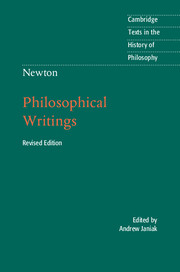Book contents
- Frontmatter
- Contents
- Acknowledgments
- Introduction
- Chronology
- Further reading
- Note on texts and translations
- I “New Theory about Light and Colours”
- II Correspondence with Robert Boyle [1679]
- III De Gravitatione [date unknown]
- IV The Principia [1687, first edition]
- V “An Account of the System of the World”
- VI Correspondence with Richard Bentley [1691–3]
- VII Correspondence with G. W. Leibniz [1693/1712]
- VIII Correspondence with Roger Cotes [1713]
- IX An Account of the Book Entitled Commercium Epistolicum [1715]
- X Queries to the Opticks [1721]
- Index
- References
II - Correspondence with Robert Boyle [1679]
Published online by Cambridge University Press: 05 August 2014
- Frontmatter
- Contents
- Acknowledgments
- Introduction
- Chronology
- Further reading
- Note on texts and translations
- I “New Theory about Light and Colours”
- II Correspondence with Robert Boyle [1679]
- III De Gravitatione [date unknown]
- IV The Principia [1687, first edition]
- V “An Account of the System of the World”
- VI Correspondence with Richard Bentley [1691–3]
- VII Correspondence with G. W. Leibniz [1693/1712]
- VIII Correspondence with Roger Cotes [1713]
- IX An Account of the Book Entitled Commercium Epistolicum [1715]
- X Queries to the Opticks [1721]
- Index
- References
Summary
Cambridge, 28 February 1678/9
Honoured Sir,
I have so long deferred to send you my thoughts about the physical qualities we spoke of, that did I not esteem myself obliged by promise, I think I should be ashamed to send them at all. The truth is, my notions about things of this kind are so indigested, that I am not well satisfied myself in them; and what I am not satisfied in, I can scarce esteem fit to be communicated to others; especially in natural philosophy, where there is no end of fancying. But because I am indebted to you, and yesterday met with a friend, Mr Maulyverer, who told me he was going to London, and intended to give you the trouble of a visit, I could not forbear to take the opportunity of conveying this to you by him.
1. It being only an explication of qualities, which you desire of me, I shall set down my apprehensions in the form of suppositions, as follows. And first, I suppose, that there is diffused through all places an aethereal substance, capable of contraction and dilatation [i.e. dilation], strongly elastic, and in a word much like air in all respects, but far more subtle.
2. I suppose this aether pervades all gross bodies, but yet so as to land rarer in their pores than in free spaces, and so much the rarer, as their pores are less. And this I suppose (with others) to be the cause, why light incident on those bodies is refracted towards the perpendicular; why two well polished metals cohere in a receiver exhausted of air; why mercury stands sometimes up to the top of a glass pipe, though much higher than 30 inches; and one of the main causes, why the parts of all bodies cohere; also the cause of filtration, and of the rising of water in small glass pipes above the surface of the stagnating water they are dipped into: for I suspect the other may stand rarer, not only in the insensible pores of bodies, but even in the very sensible cavities of those pipes. And the same principle may cause menstruums [i.e. solvents] to pervade with violence the pores of the bodies they dissolve, that surrounding [the] aether, as well as the atmosphere, pressing them together. …
- Type
- Chapter
- Information
- Newton: Philosophical Writings , pp. 15 - 25Publisher: Cambridge University PressPrint publication year: 2014



